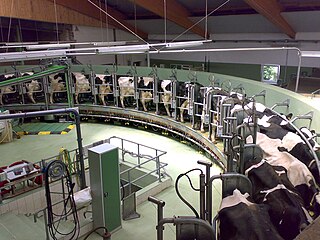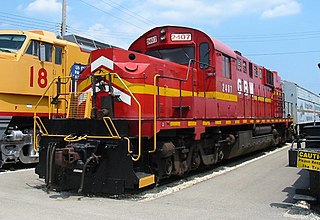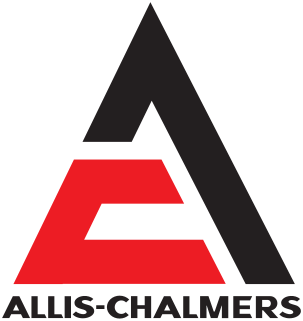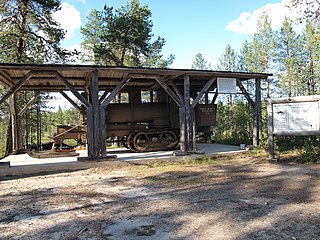Formerly | A. Hamacek and Company |
|---|---|
| Industry | Agricultural Products |
| Successor | Badger Northland, Inc |
| Founded | 1883 |
| Founders | Adolph and Anton Hamacek |
| Defunct | 1962 |
| Headquarters | Algoma, Wisconsin |
| Products | Agricultural Products |
| Brands | OK |
The Algoma Foundry and Machine Company of Algoma, Wisconsin began its corporate existence in 1883 as a regional manufacturer of horse-drawn farm machinery. However, in 1920 the company started making the "OK" silo filler or stationary ensilage harvester. Immediately following its introduction the OK silo filler became very popular with the dairy farming market across the Upper Midwest of the United States. Sales of the OK soon made the Algoma Company a leading producer of silo fillers in the entire nation.

Algoma is a city in Kewaunee County in the U.S. state of Wisconsin. The population was 3,167 at the 2010 census. Algoma is part of the Green Bay Metropolitan Statistical Area.

Dairy farming is a class of agriculture for long-term production of milk, which is processed for eventual sale of a dairy product.
The Upper Midwest is a region in the northern portion of the U.S. Census Bureau's Midwestern United States. It is largely a sub-region of the Midwest. Although there are no uniformly agreed-upon boundaries, the region is most commonly used to refer to the states of Minnesota, Wisconsin, Michigan, Iowa, South Dakota, and North Dakota.
The Algoma Foundry and Machine Company was founded in 1883 as A. Hamacek and Company by Adolph and Anton Hamacek of Algoma Wisconsin. [1] The Company manufactured horse-drawn farm machinery for the regional market. However, on August 28, 1891, Adolph Hamacek left the business partnership and moved to nearby Sturgeon Bay, Wisconsin. Anton continued to operate the business alone at the building located in the 600 block of Fremont Street in Algoma until 1893, when he formed another partnership with Joseph Wodsedalek and August Ziemer.

Sturgeon Bay is a city in and the county seat of Door County, Wisconsin, United States. The population was 9,144 at the 2010 census. It is located at the natural end of Sturgeon Bay, although the Sturgeon Bay Ship Canal was built across the remainder of the Door Peninsula.
On August 6, 1895, fire broke out at the building that on Fremont Street that served as the Foundry's place of business. The two-story building was totally destroyed by the fire. Consequently, following the fire the business obtained new property located north of the Ahnapee River, just east of the Fourth Street Bridge in Algoma. This property was owned by John Ihlenfeld who happened to be the father-in-law of Joseph Wodsedalek. The business was fortunate to obtain this property because it was served by the nearby depot of the Ahnapee and Western Railway located just south of the Ahnapee River.

Fire is the rapid oxidation of a material in the exothermic chemical process of combustion, releasing heat, light, and various reaction products. Slower oxidative processes like rusting or digestion are not included by this definition.

A foundry is a factory that produces metal castings. Metals are cast into shapes by melting them into a liquid, pouring the metal into a mold, and removing the mold material after the metal has solidified as it cools. The most common metals processed are aluminium and cast iron. However, other metals, such as bronze, brass, steel, magnesium, and zinc, are also used to produce castings in foundries. In this process, parts of desired shapes and sizes can be formed.

The Ahnapee and Western Railway (A&W) was a common carrier short line railroad located in northeastern Wisconsin.
Based on the new transportation opportunities opened up by the connection with the Ahnapee and Western Railway the foundry entered a period of business expansion as they began to serve the farming market of the entire multi-state upper Midwest area of the United States.
In 1962, the company was sold for $800,000 to Badger Northland, Inc, of Kaukauna, Wisconsin, a manufacturer of mechanized farm equipment. [2]

Kaukauna is a city in Outagamie and Calumet counties, Wisconsin, United States. It is situated on the Fox River, approximately 100 miles (160 km) north of Milwaukee. The population was 15,462 at the 2010 census. It is a part of the Appleton, Wisconsin Metropolitan Statistical Area.












